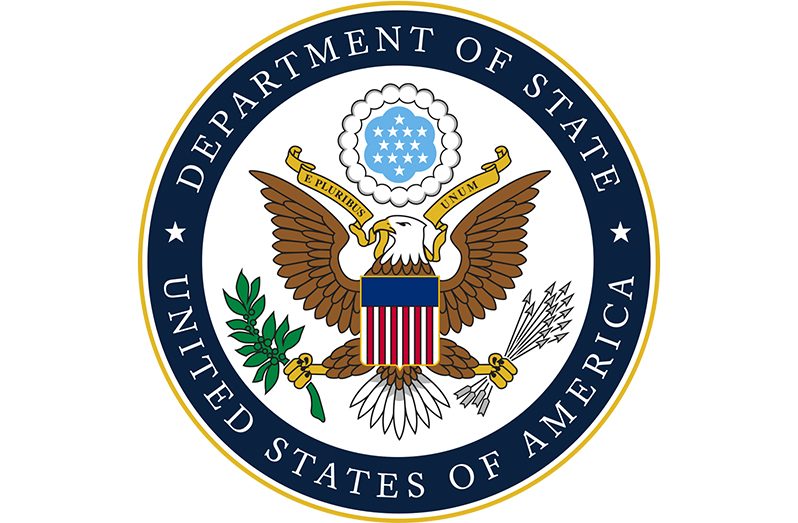-US report says citizens’ constitutional rights are respected
GUYANA’S Government has taken significant steps to identify, prosecute, and punish officials who have committed human rights abuses or are engaged in corruption, according to the United States (US) Department of State’s 2022 country report on human rights practices.
It highlighted that significant human rights issues included credible reports of unlawful or arbitrary killings, including extrajudicial killings; laws that criminalise consensual same-sex sexual conduct between adult men, which were not enforced; and the existence of the worst forms of child labour.
As it relates to freedom of expression, the report noted that independent news media were active and have expressed a wide variety of views without restriction.
However, it was pointed out that the ruling party’s monopoly of State media created an imbalance in public discourse and tended to give the party a public affairs advantage since the Opposition did not have an outlet of its own.
With regards to internet freedom, the report said: “The government did not restrict or disrupt access to the internet or censor online content, and there were no credible reports that the government monitored private online communications without appropriate legal authority.”
While noting that the country’s Constitution provides for the freedom of peaceful assembly and association, it was determined that the government generally respected those rights.
The US state agency found that Guyana’s government respected citizens’ legal right to freedom of internal movement, foreign travel, emigration, and repatriation.
As it relates to the freedom to participate in the political process, the report explained that Guyana’s laws provide citizens with the ability to choose their government in free and fair periodic elections held by secret ballot and based on universal and equal suffrage. Elections also take place within indigenous communities, where members elect indigenous leaders every 33 to 36 months, it said.
It added that there are no laws limiting the participation of women or members of minority groups in the political process, and they did participate.
On the issue of “Corruption and lack of Transparency in Government,” the report said that the “law provides for criminal penalties for corruption by officials” and the ruling party “generally implemented the law effectively.”
Against this backdrop, the US agency noted that there were isolated reports of government corruption during the year, and they were investigated.
“There remained a widespread public perception of corruption involving officials at all levels and all branches of government, including the judiciary and police,” it said.
It was explained that several domestic human rights groups generally operated without government restriction, investigating and publishing their findings on human rights cases.
“The law provides for an ombudsperson to investigate official government actions or actions taken by government officials in the exercise of their official duties. Observers reported the ombudsperson operated independently of government interference, and they considered the ombudsman to be somewhat effective,” the report said.
With regards to discrimination and societal abuse, the report emphasised that the country’s laws provide stringent penalties for rape, with life imprisonment as the maximum penalty. This led to the successful prosecution of domestic violence cases frequently, it said.
Regarding persons living with disabilities, the report noted that while Guyana’s public healthcare system is accessible to these persons, most public buildings are inaccessible. It was pointed out that new schools were being built with ramps and elevators to accommodate such persons.
Some information from the government was provided in accessible formats, including sign language, audio, and braille. The transportation system, particularly the privately owned minibuses, was not accessible to persons with physical disabilities.
HARSH CONDITIONS
While noting that there were no reports of political prisoners or detainees, the report said that prison and jail conditions, particularly in the holding cells, were reportedly “harsh and potentially life-threatening due to overcrowding, prisoner-on-prisoner violence, physical abuse, and inadequate sanitary conditions.”
For this year, the government has set aside $5.5 billion for the Guyana Prison Service (GPS) to improve facilities and training for inmates to ensure their proper reintegration into society as productive people while curbing recidivism.
Some of the capital expenses for the GPS this year include upgrades to the Mazaruni, New Amsterdam and Lusignan prisons to the tune of $2.1 billion, and $15 million for the purchase of vehicles. Additionally, $175 million has been set aside for the provision of furniture, tools and equipment.
The Prison Headquarters will be housed at the new prison complex at Lusignan where a ‘prison school’ is being built to facilitate the inmates’ training and education.
The US report also raised the issue of lengthy pre-trial detentions which they said is due to judicial inefficiency, staff shortage and cumbersome legal procedures.
“The average length of pretrial detention was three years for those awaiting trial at a Magistrates’ Court or the High Court. This often exceeded the maximum possible sentence for the crime for which they were charged,” the report said.
To remedy this, the government will soon be appointing the Judicial Service Commission (JSC) and appointment of more judges.
Additionally, the government plans to abolish preliminary inquiries (PI) in the Magistrates’ Court for indictable criminal offences in a bid to reduce the time persons facing capital offence charges spend on remand while awaiting trials in the High Court.
With the abolishing of PIs, the long backlog of cases at the High Court and having persons languishing on remand in prison should be addressed. The State will also be strengthening the plea-bargaining legislation.



.jpg)








